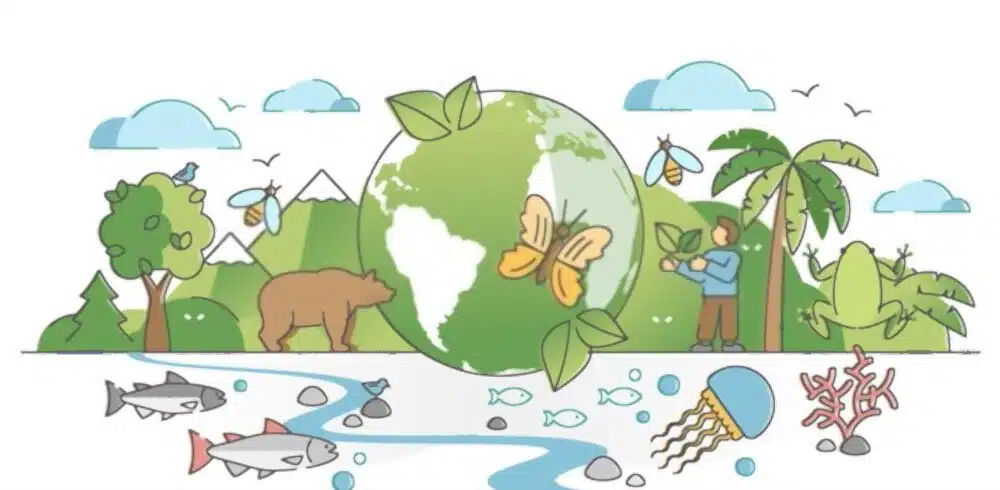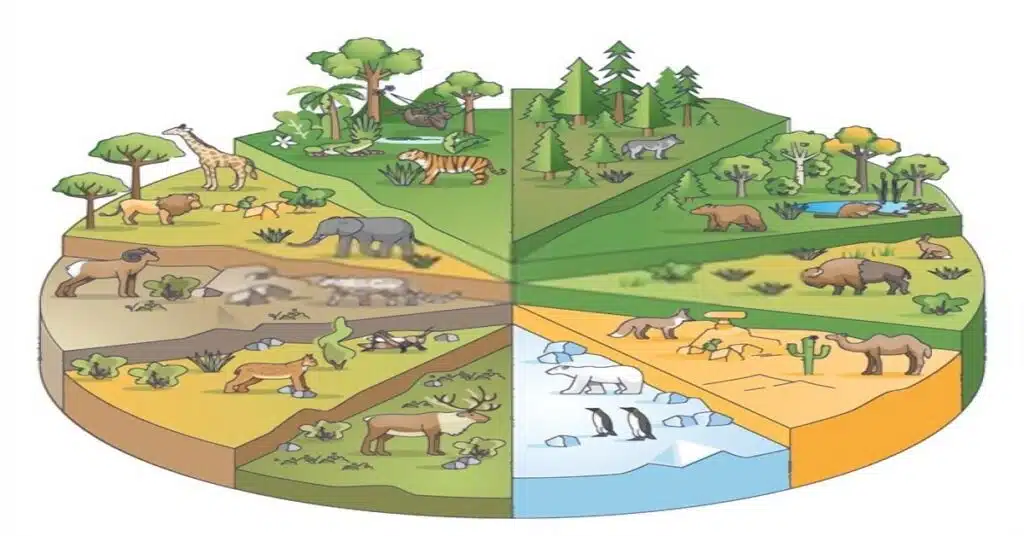
Biodiversity is all around us. From the tiniest microorganisms to towering trees and majestic elephants all comes under biodiversity. It’s what makes our planet such a unique and special place. But did you know that this delicate balance of life is under threat? In this essay on biodiversity, we’ll explore why it’s so important and what we can do to protect it for generations to come. Let’s understand that in a better way through short and long essay on biodiversity.
Essay on Biodiversity in English- 100 words
Biodiversity is the variety of life on Earth. It is very important for the functioning of ecosystems. It contributes to the survival of species. Biodiversity includes all different kinds of plants, animals, tiny organisms. It’s important because it helps keep ecosystems stable. Biodiversity regulates the climate and provides food and resources for people. Sadly, humans are causing harm to biodiversity by cutting down forests. We are polluting and destroying habitats. We must realize how important biodiversity is. We must do something to safeguard it for the future. Protecting biodiversity is the responsibility of everyone. By doing so we can contribute to the long-term survival of our planet.
Essay on Biodiversity in English- 150 words
Biodiversity means the many different types of life on Earth. It includes tiny bacteria, tall trees, and amazing animals. Each species has a special job in keeping ecosystems healthy.
Biodiversity is very important because it helps to keep our planet balanced and strong. Biodiversity does many things like pollinate plants, recycle nutrients, make soil, and clean water. These things important everyone’s survival on the earth.
Sadly, human activities have hurt biodiversity a lot. Humans are cutting down forests, destroying habitats, polluting atmosphere and changing the climate are causing many species to die out. This is really bad for ecosystems because it makes them less productive. If this continues we are likely to get sick or have other problems.
Saving biodiversity is something everyone needs to do. We have to take care of the land and resources in a smart way. We should protect special areas, fix places that have been hurt, and make strong rules to protect the environment. It’s also important to appreciate nature. If we all work together, we can keep Earth’s amazing biodiversity safe for the future.
Also Read:
- Essay on How Animals Are Useful
- Essay on Conservation of Plants and Animals
- Powerful Essay on Animals in English
- Paragraph on Conservation of Wildlife
- Paragraph on Forest

Essay on Biodiversity in English- 200 words
Biodiversity refers to the variety of living organisms that live on our planet. From tiny microorganisms to massive mammals, biodiversity surrounds all forms of life on Earth. Basically, biodiversity is what makes our planet unique and beautiful.
Biodiversity helps keep nature balanced and provides many benefits like clean air, water, fertile soil, medicines, and food. Biodiversity also supports ecosystems, regulates climate, and helps crops grow through pollination.
It’s important for us to understand the significance of biodiversity and its role in maintaining ecological balance. Each species plays an essential part in the food chain and contributes towards sustaining ecosystems.
Unfortunately human actions are harming biodiversity at a large scale. Cutting down forests, polluting, and overfishing have caused animals to disappear and hurt ecosystems.
To protect biodiversity, we all need to work together. Governments must make conservation a priority and promote sustainable practices in communities.
So to conclude Biodiversity is a complex and essential component of the natural world. It allows us to appreciate the beauty and complexity of nature. It provides us with food, medicine, and other resources, and supports our overall wellbeing. Without biodiversity we would not be able to survive as a species; it is integral for maintaining balance in our environment. Therefore, conserving biodiversity should be seen as an investment in securing healthy ecosystems for generations to come.
Essay on Biodiversity in English- 300 words
Biodiversity is nature’s greatest treasure. It is the heartbeat of our planet, and its loss could have grave consequences for all life forms. It provides us numerous benefits and services that are vital for everyone’s existence.
From rare species to common ones, from microbes to mammals, biodiversity plays an essential role in maintaining the balance of our ecosystems. Let’s explore why it matters and what can be done to protect it.
Biodiversity is important for several reasons.
First, biodiversity helps maintain ecosystem services that are essential to human well-being. For example, healthy ecosystems provide clean air and water, regulate climate, and provide food and other resources.
Second, biodiversity is a key driver of economic growth and development. The world’s forests, fisheries, and other natural resources are worth trillions of dollars and support millions of jobs.
Third, biodiversity is a source of inspiration and wonder, with its many unique species providing aesthetic value and opportunities for recreation. Biodiversity is important for its own sake—it is the foundation upon which life on Earth depends.
It is an alarming fact that biodiversity is getting harmed at an alarming rate. Ecological disaster is taking place. It occurs when an ecosystem is severely harmed, often irreversibly. Disasters can be caused by natural disasters such as floods or earthquakes, or by human activities such as pollution or over-exploitation of resources.
As the human population continues to grow, so does the amount of waste we produce. Unfortunately, much of this waste is not biodegradable, which means it can take centuries to break down. And as it decomposes, it releases harmful chemicals and pollutants into the environment. There are several things we can do to reduce environmental pollution and favour biodiversity
Pollute less: We can all help reduce pollution by doing things like carpooling, biking or walking instead of driving, using public transportation, and recycling
Recycle more: Recycling is one of the best ways to reduce pollution. It helps keep materials out of landfills where they would release harmful chemicals as they decompose.
Waste less: We can all help reduce pollution by wasting less food and water. If we have food that we know we won’t eat, we can donate it to a food bank. And if we’re not using all the water in our faucets or showerheads, we can turn them off until we need them again.
We have to take responsibility for protecting it so that future generations can continue to enjoy its many benefits. It is important for us to remember that we are part of this natural system, and it is up to us to ensure its survival.

Essay on Biodiversity in English- 500+ words
Biodiversity, the variety of life on earth, is a crucial component for our planet’s health and survival. It encloses everything from tiny microorganisms to majestic elephants and provides us with essential services like clean air, food, water, and medicine.
Sadly, biodiversity loss has become a pressing issue in recent times due to human activities such as deforestation, pollution and climate change. In this essay on biodiversity in English, we’ll explore the importance of biodiversity as well as its different types while also examining the causes and consequences of its depletion.
What is Biodiversity?
Biodiversity, or biological diversity, refers to the variety of living organisms on earth. It encompasses not only different species of animals and plants but also microorganisms like bacteria and viruses.
This diversity plays a crucial role in maintaining the balance of ecosystems by ensuring that each organism has access to what it needs to survive. For example, bees play a vital role in pollinating flowers which helps to produce food for humans and other animals.
The term biodiversity can be further broken down into three categories – genetic diversity, species diversity, and ecosystem diversity. Genetic diversity refers to the variations within individual species while species diversity is the number of different types of organisms present in an ecosystem. Ecosystem diversity concerns the variety of habitats or environments where these various organisms reside.
Unfortunately, human activities such as deforestation, pollution and climate change pose significant threats to biodiversity leading to its depletion at an alarming rate across many parts of our planet.
The Importance of Biodiversity
Essential to the Survival of all Living Organisms – Biodiversity is essential to the survival of all living organisms on Earth. It provides us with a variety of resources, including food, medicine, and raw materials for industry. Biodiversity also plays a crucial role in regulating our climate by producing oxygen and removing carbon dioxide from the atmosphere.
Enhances the Beauty of our Planet – Moreover, biodiversity enhances the beauty of our planet through its diverse array of flora and fauna that adds color and life to every corner of this world. The preservation of biodiversity ensures that future generations will have access to these natural wonders.
Supports Ecosystem’s Stability- Furthermore, biodiversity supports ecosystems’ stability by increasing their resistance to diseases, pests, and other environmental stressors. It maintains ecological balance by ensuring that different species coexist in harmony while maintaining their unique roles in nature’s web-of-life.
Contributes towards Poverty Reduction- In addition, protecting biodiversity contributes significantly towards poverty reduction across many communities worldwide who rely on it for their livelihoods such as fishermen or farmers. This highlights how much humanity depends on nature’s diversity for economic development.
The importance of preserving biodiversity cannot be overstated as it benefits not only wildlife but also human society at large.
The Different Types of Biodiversity
Biodiversity refers to the variety of life on Earth, which includes different species, genetic diversity within species, and ecosystems. There are three main types of biodiversity that exist: genetic diversity, species diversity and ecosystem diversity.
Genetic Diversity- Genetic diversity is the variation in genes within a single population or across different populations of a given species. This type of biodiversity ensures that there are various traits present among individuals in any given population which can help them adapt to changing environmental conditions.
Species Diversity- Species Diversity is defined as the variety of living organisms present in an area at a particular period. It also involves differences between these organisms such as their behavior, morphology, and physiology among others.
Species Diversity- Ecosystem Diversity pertains to the range of habitats and ecosystems found on Earth. These include terrestrial biomes like forests, grasslands, and deserts; aquatic systems like oceans, rivers and wetlands; as well as transitional areas like mangroves or coral reefs.
Each type plays an important role in maintaining healthy ecological balance by supporting each other’s existence through complex interactions known as “ecosystem services.”

The Causes of Biodiversity Loss
There are numerous causes of biodiversity loss, and it is often a result of human activities.
Habitat Destruction or Fragmentation – One major factor for Biodiversity loss is habitat destruction or fragmentation caused by agriculture, urbanization, logging, and mining. As people continue to expand their living spaces and exploit natural resources for economic gain, they inevitably destroy habitats that support various species.
Climate Change – Another significant cause of biodiversity loss is climate change. This phenomenon has resulted in rising temperatures across the globe which directly impact different ecosystems worldwide. Climate change affects the distribution of various species as they struggle to adapt to new environments with changing conditions.
Overexploitation – Overexploitation also poses a threat to biodiversity as humans hunt animals beyond what the population can sustainably reproduce or harvest plants at unsustainable rates leading them towards extinction.
Pollution from Industrial Waste- Pollution from industrial waste products has resulted in contamination of air, water bodies and soil resulting in deathly impacts on diverse populations ranging from microorganisms to large mammals like whales.
Invasive Species- Finally invasive species introduced into an ecosystem leads onto disrupting ecological balances causing entire populations including native flora and fauna getting wiped out permanently leading onto extinction events.
If we do not take action against these threats soonest possible time then the future may look very bleak indeed!

The Consequences of Biodiversity Loss
Impact on Food Production- Biodiversity loss has serious consequences for food production. Many crops rely on pollinators like bees and butterflies. Without them, there could be a significant reduction in food production.
Loss of Medicinal Resources- The decline in biodiversity could lead to the loss of valuable medicinal resources. Many modern medicines come from natural substances found in diverse environments. A decrease in biodiversity may limit our ability to discover new treatments.
Risk of Ecosystem Collapse- Biodiversity loss can cause ecosystems to collapse. This means the entire ecosystem becomes unbalanced and unable to support life. It can have a ripple effect, impacting other ecosystems and species.
Economic Consequences- The loss of biodiversity can have economic implications, especially for communities dependent on tourism or outdoor recreation. These environments attract visitors due to their beauty and uniqueness, but without biodiversity, they may lose their appeal.
Importance of Protecting Biodiversity- The consequences of biodiversity loss are significant and should not be underestimated. It is crucial that we take action to protect the diversity of our planet before it’s too late.
How to Protect Biodiversity?
Protecting biodiversity is crucial to maintaining a healthy and sustainable environment for all living beings. There are several measures that can be taken to protect biodiversity, including:
1.Conservation efforts: Protecting natural habitats and ecosystems through conservation efforts is critical to preventing the loss of biodiversity.
2.Sustainable practices: Adopting sustainable practices such as reducing greenhouse gas emissions, avoiding single-use plastics, and practicing responsible agriculture can help prevent habitat loss and degradation.
3.Education: Educating communities about the importance of biodiversity and how they can contribute towards protecting it can go a long way in creating awareness and fostering positive change.
4.Legal protection: Governments must enact laws that protect endangered species from hunting, poaching, deforestation, pollution, or other forms of human activities which may cause harm to their survival.
5.Collaboration: It’s important for individuals, governments, businesses, and organizations to work together towards protecting our planet’s biodiversity by supporting initiatives designed specifically around this goal.
These actions may seem small but when done collectively have a significant impact on preserving existing ecosystems while allowing them time regenerate back into their original state without any further harm caused upon them by humans; ultimately ensuring the continuous existence of all living beings on Earth now-future generations will experience its irrevocable beauty intact.
Conclusion
Biodiversity is a crucial aspect of our planet that needs to be protected. It provides us with the basic necessities of life such as food, medicine, and clean water. The loss of biodiversity not only affects the environment but also has severe consequences for human health and well-being.
It is essential that we take action to protect our planet’s biodiversity by reducing our carbon footprint, conserving natural habitats, enforcing laws against illegal hunting and logging activities, promoting sustainable farming practices, and educating people about the importance of biodiversity.
By taking these steps together as a global community, we can make sure that future generations inherit a planet rich in biological diversity. Let us work towards creating a world where humans coexist harmoniously with other living beings on earth.
FAQs-
1) What is biodiversity?
Biodiversity refers to the variety of life forms and the range of biological diversity within a particular ecosystem, region, or the entire planet. It encompasses the different species of plants, animals, and microorganisms, their genetic variations, and the complex interactions and ecosystems they form. Biodiversity is often measured by the number of species present in a given area, but it also includes the diversity of habitats, ecological roles, and genetic diversity within species.
Biodiversity plays a crucial role in maintaining the stability and resilience of ecosystems. It provides numerous ecosystem services such as nutrient cycling, pollination, water purification, soil formation, and climate regulation, which are essential for human well-being. Biodiversity also contributes to cultural, aesthetic, and recreational values, and it has potential economic importance through industries like agriculture, forestry, fisheries, and pharmaceuticals.
However, biodiversity is currently facing significant threats due to human activities, such as habitat destruction, pollution, climate change, overexploitation of natural resources, and introduction of invasive species. These factors are leading to a rapid loss of species and ecosystems, resulting in a global biodiversity crisis. Protecting and conserving biodiversity is crucial for the sustainability of ecosystems and the long-term survival of both human and non-human life on Earth.
2) Why preserve and encourage biodiversity?
Preserving and encouraging biodiversity is crucial for several reasons:
1.Ecosystem Stability: Biodiversity contributes to the stability and resilience of ecosystems. A diverse array of species helps maintain important ecological processes such as nutrient cycling, soil formation, and pest control. Ecosystems with higher biodiversity are more resistant to disturbances like climate change, disease outbreaks, and invasive species, ensuring their long-term survival and functioning.
2.Ecosystem Services: Biodiversity provides numerous ecosystem services that are essential for human well-being. These include the production of food, clean air and water, climate regulation, flood control, and pollination of crops. Preserving biodiversity ensures the continuation of these services, which are vital for sustaining human societies and economies.
3.Genetic Resources: Biodiversity represents a vast pool of genetic resources. Different species and their genetic variations provide valuable traits and adaptations that can be used for agriculture, medicine, and biotechnology. Many of our current crops, livestock, and medicines are derived from diverse genetic sources found in nature.
4.Cultural and Aesthetic Value: Biodiversity has cultural and aesthetic importance. It forms the basis of diverse cultural practices, traditions, and spiritual beliefs. People derive enjoyment, inspiration, and recreation from the natural world, including its rich biodiversity. Preserving biodiversity ensures that future generations can continue to appreciate and benefit from these cultural and aesthetic values.
5.Ethical Responsibility: Many people believe that we have an ethical responsibility to protect and conserve biodiversity. Every species has inherent value and has the right to exist and thrive. As the dominant species on Earth, humans have a moral obligation to act as responsible stewards of the planet, ensuring the survival of diverse life forms and maintaining the integrity of ecosystems.
6.Unknown Benefits: Biodiversity is still largely unexplored, and many species and their interactions remain undiscovered. Preserving biodiversity increases the chances of discovering new medicines, technologies, and solutions to challenges we may face in the future. Losing species through extinction means losing potential knowledge and benefits that we may not even be aware of yet.
By preserving and encouraging biodiversity, we can safeguard the health and functioning of ecosystems, secure vital ecosystem services, respect the intrinsic value of species, and ensure a sustainable future for both humans and the diverse array of life on Earth.
3)What are five threats to biodiversity?
There are several significant threats to biodiversity. Here are five major threats:
1.Habitat Loss and Degradation: The conversion of natural habitats into agricultural lands, urban areas, industrial sites, and infrastructure development leads to the loss and fragmentation of habitats. This disrupts ecosystems and displaces species, reducing their populations and biodiversity. Deforestation, wetland drainage, coral reef destruction, and land conversion are examples of habitat loss and degradation.
2.Climate Change: The warming of the planet due to human activities, primarily through the emission of greenhouse gases, poses a serious threat to biodiversity. Climate change alters temperature and precipitation patterns, causing shifts in habitats, disrupting species’ life cycles, and affecting their distribution. It can lead to habitat loss, increased frequency and intensity of extreme weather events, sea-level rise, and changes in ecosystems that threaten many species.
3.Overexploitation and Unsustainable Harvesting: Overexploitation of natural resources, such as overfishing, illegal wildlife trade, poaching, and excessive logging, can significantly depleted populations of targeted species. Unsustainable harvesting practices can lead to the decline and extinction of species, disrupt food chains, and harm ecosystems. The loss of keystone species can have cascading effects on the entire ecosystem.
4.Pollution: Pollution, including air pollution, water pollution, and soil contamination, has detrimental effects on biodiversity. Chemical pollutants from industrial and agricultural activities can accumulate in ecosystems and harm organisms directly or indirectly. Pollution can cause habitat degradation, affect reproductive capabilities, disrupt ecosystems, and contribute to the decline of species.
5.Invasive Species: Invasive species are non-native species that are introduced to new areas, either intentionally or accidentally. They can outcompete native species for resources, prey on them, introduce diseases, and alter habitats. Invasive species can have devastating impacts on native biodiversity, leading to the decline or extinction of native species and disrupting ecosystems.
4)Is economic value a benefit of biodiversity?
Yes, economic value is one of the benefits associated with biodiversity. Biodiversity contributes significantly to economies around the world in various ways:
1.Industries and Employment: Many industries rely on biodiversity and ecosystem services for their economic viability. Agriculture, forestry, fisheries, and aquaculture are directly dependent on diverse ecosystems and species. These sectors provide food, raw materials, and employment opportunities for millions of people globally.
2.Tourism and Recreation: Biodiversity-rich areas attract tourists and nature enthusiasts. Natural landscapes, national parks, wildlife reserves, and ecotourism destinations offer recreational opportunities and generate revenue through tourism activities such as wildlife watching, hiking, and nature photography. This revenue supports local economies, creates jobs, and encourages conservation efforts.
3.Biotechnology and Pharmaceuticals: Biodiversity is a valuable source of genetic resources for biotechnological and pharmaceutical research. Many plants, animals, and microorganisms contain bioactive compounds that have potential medical applications. Pharmaceutical companies and researchers explore biodiversity to discover new drugs and develop treatments for various diseases, creating economic opportunities in the pharmaceutical industry.
4.Ecosystem Services: Biodiversity provides ecosystem services that have economic value. These services include crop pollination by bees and other pollinators, water filtration by wetlands, carbon sequestration by forests, and natural pest control. These services contribute to agricultural productivity, water availability, climate regulation, and overall environmental sustainability, ultimately benefiting economies.
5.Genetic Resources and Crop Improvement: Biodiversity represents a vast reservoir of genetic resources. Wild relatives of crops contain valuable genetic traits that can be used to improve cultivated varieties for traits like disease resistance, yield, and nutritional content. Crop breeding programs rely on genetic diversity within species to develop more productive and resilient crop varieties, benefiting agriculture and food production.
While economic value is an important aspect of biodiversity, it is essential to balance economic considerations with the intrinsic value of biodiversity and the need for its conservation. It is crucial to recognize and account for the full range of benefits provided by biodiversity, including cultural, ecological, and ethical values, in order to ensure sustainable and responsible management of natural resources.
6) What is the social value of biodiversity?
The social value of biodiversity refers to the benefits that biodiversity provides to human societies and communities.
Here are some key aspects of the social value of biodiversity:
1.Health and Well-being: Biodiversity and natural environments have a positive impact on human health and well-being. Access to green spaces, forests, and natural landscapes has been shown to reduce stress, improve mental health, and promote physical activity. Biodiversity-rich environments can offer opportunities for recreation, relaxation, and connection with nature, contributing to overall well-being.
2.Cultural Identity and Traditions: Biodiversity is deeply intertwined with the cultural identity and traditions of many societies. Indigenous peoples and local communities have strong cultural connections to their surrounding ecosystems, and their identities, knowledge systems, and traditional practices are often rooted in the relationship with biodiversity. Preserving biodiversity is essential for maintaining cultural diversity and the continuity of traditional knowledge and practices.
3.Ecological Knowledge and Learning: Biodiversity provides a wealth of knowledge and learning opportunities. Studying and understanding different species, their interactions, and ecosystems deepens our knowledge of the natural world. Indigenous peoples and local communities often possess traditional ecological knowledge that has been accumulated over generations, offering valuable insights into sustainable resource management, medicinal plant use, and ecological practices.
4.Education and Science: Biodiversity serves as an important educational tool. It offers opportunities for scientific research, ecological studies, and environmental education. Biodiversity-related topics can inspire curiosity and interest in the natural world, fostering a sense of wonder and encouraging learning about ecological systems, conservation, and sustainable practices.
5.Sense of Place and Aesthetics: Biodiversity contributes to the sense of place and aesthetics of a location. Diverse ecosystems, landscapes, and wildlife contribute to the beauty and uniqueness of different regions. The presence of diverse flora and fauna in natural environments can evoke a sense of wonder, appreciation, and aesthetic enjoyment, enriching the human experience.